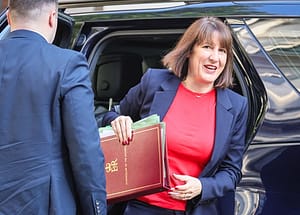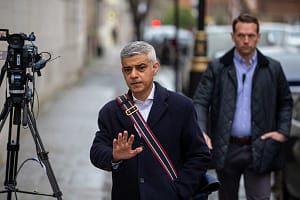Some of his policies are undoubtedly sensible, but can we rely on a politician who is so apparently reckless when he talks?
Even though it is Ken Livingstone, I still find it quite astonishing how unguarded he is during our interview. It was only in 2006 that he was suspended from his mayoralty for four weeks for comparing Jewish journalist Oliver Finegold to a Nazi concentration camp guard. Some said the remark was blown out of all proportion. Others, including the Jewish Board of Deputies, were deeply offended.
You’d have thought Ken would steer clear of anything the Jewish community might be sensitive to when talking to a journalist. Instead, this is what happens.
We are talking about Yusuf Al-Qarawadi, the Muslim leader portrayed as an extremist and/or hate cleric by much of the media, who became an ally of Livingstone’s. Livingstone is defending his relationship with him. Al-Qarawadi, he tells me, is “somebody who had constantly said that Muslims shouldn’t attack Britain and London and that violence couldn’t be justified – I thought it was really important to reach someone like that”.
I thought the main criticism of Al-Qarawadi was that he condoned violence? “No, no, the one thing he has always said is that Palestinians have the right to fight and to kill in the struggle round Israel. But he’s always been absolutely clear that that was the only area in which violence could be justified.”
“People like Michael Gove and others have been stridently Islamaphobic for some time”
Now, I’m not sure this is the wisest defence of character drawn by Mr Livingstone, bearing in mind, however justified or unjustified, the accusations of anti-Semitism he elicited only five years ago.
I almost feel bad publishing his remarks, because it seems he says these things so off-the-cuff that he doesn’t consider how they might sound. Then again, I’m reminded of the line from Alistair Campbell’s memoir, in which he wrote: “[Livingstone] was running rings around us”. Quite some praise coming from Campbell.
Livingstone continues: “The people like Michael Gove who are fervent Zionists and Boris Johnson, they wanted to isolate Al-Qarawadi because he’s a critic of Israel. And they ignored the fact he strongly urges Muslims not to launch attacks here in Britain.”
Well, you can’t fault his loyalty to Al-Qarawadi. But calling Gove and Johnson Zionists, in this context, feels pretty punchy.
He also tells me, “People like Michael Gove and others have been stridently Islamaphobic for some time, and they assume there are votes in this”.
I double check I have heard this accusation right – how do you mean Gove is “stridently Islamaphobic”? “Just look at his writings and the general tone he takes is to depict Islam as genuinely a threat. He’s at the extreme end of this.”
It’s worth noting that Gove has written a book called Celsius 7/7, warning of the threat of Islamist extremists to the West. But Livingstone’s words seem, again, fairly strong.
It was only in spring last year that Livingstone had to pay an estimated £11,000 in libel damages to former leader of the Tower Hamlets council, Michael Keith, for accusing him too of “Islamaphobia”.
Perhaps my surprise at Livingstone calling Gove an Islamophobe is my own fault for not researching sufficiently. In March this year, Livingstone told Iran’s Press TV:
“I think the core around Prime Minister David Cameron and a small group of neo-conservatives like Michael Gove – their objective really is to turn Britain into a small version of America. […] I think we have got a virulently pro-American government.”
Livingstone obviously does not share any of the government’s supposed fervour for our neighbour over the pond. Talking about how to prevent terrorism, he tells me: “The best way to manage risks is to create the genuine impression that you’re actually fair, which means trying to keep yourself as distant as possible from America and its wars.”
Incidentally, Livingstone was on the payroll of Iran’s Press TV earlier this year (the hosts of the aforementioned interview).
This ruffled a fair few feathers, as Press TV is state-owned by Iran. President Ahmadinejad, who launched Press TV in 2007, is a Holocaust denier, among other his less-than-palatable traits.
Other journalists have done interesting work on Livingstone’s somewhat contentious relationships with controversial figures and Muslim extremist groups. I’m not going to get into the bloody intestines of all that here. Andrew Gilligan’s London blog for the Daily Telegraph does that, and Martin Bright’s Dispatches 2008 investigation “The Court of Ken” raised various questions too.
I actually agree with Livingstone’s overall sentiment that it’s a sensible strategy to reach out to the more extreme ends of the Muslim community, to reduce the risk of terrorist acts – which was his general gist throughout this part of our conversation.
Livingstone wrote what was, to me at least, a particularly lucid explanation of his thinking on this matter in introduction to his interview of Hamas leader Khaled Meshal for Prospect: “No major conflict can be resolved without each side talking to the other. That was the case in South Africa, Ireland and countless other situations where people said they would never talk to their opponents. I was vilified in the Eighties for saying that, to resolve the Irish conflict, you had to talk to Gerry Adams and Martin McGuinness.”
But accusing Michael Gove of Islamaphobia, and painting Gove and Johnson as Zionists in this context? His colloquial laxity feels a little cack-handed for a politician.
Is it really that likely that all his gaffes are genuine?
There was also, most recently of course, Livingstone’s foolish joke about the mayoral competition between him and Boris – “It’s a simple choice between good and evil – I don’t think it’s been so clear since the great struggle between Churchill and Hitler” – in Amber Elliot’s interview with him for Total Politics. I genuinely read that comment as a silly (very silly) quip. But, of course, it was splashed all over the nationals as if said in complete seriousness (generally along the lines of “Ken says Boris is Hitler”).
Which makes you think maybe Livingstone would be just a tads more careful when talking to journalists.
Then again, perhaps this is all clever stage management. After all, Livingstone has been dealing with the press for decades. Is it really that likely that all his gaffes are genuine? Or is it, perhaps, more realistic to assume that he knows how to get himself some press coverage? (Then again, is being offensive to some any less acceptable if it is just a PR trick?)
Maybe it is more simple than all that: maybe Livingstone just isn’t fussed about manicuring every last sentence h
e speaks, a technique we have come to expect from our politicians.
Anyway. Let’s get down to business: Livingstone on London and its companies. Because if one thing is for certain, it is that Livingstone is passionate about this city.
Ken Livingstone on London, funding and tax
Livingstone has said before that he wants independence for London, as he says it again to me. “Now, you’re never going to get that. Scotland might. London won’t, because we prop up the rest of the British economy.”
Failing independence, Livingstone is hungry for more mayoral power. He points to New York, whose mayor has power over welfare, the healthcare system and schools. He thinks “there’s a lot to be said” for a mayor who’s responsible for education: “Giving young people the skills for the sorts of jobs that are coming, not the ones that are fading off to other parts of the world.”
He likes the idea of structuring education to help rebalance the economy. “Part of our problem is over the last 30 years, since Thatcher got in, we had the deregulation of the City, and finance and services has dominated much of London’s economy. We need to have a spread of jobs.”
“Those firms that are doing really well, you want them making a bigger contribution than those that are really struggling.”
He praises Germany for giving kids a technical education, which has enabled it to create a “modern high-skill manufacturing” sector. “Unemployment in Germany is six per cent, whereas in London it’s 10 per cent,” he points out. “And Germany’s exporting goods to China, which if you think of the way things are, is quite something.”
He worries that “an awful lot of the kids growing up in London are never going to have the skills to be in business.”
Livingstone is also a big fan-boy for localised taxes. “I think you actually look at Germany or the US, where half of government spending is devolved to regional and local authorities. I think that’s a much better system than Britain, where 95 per cent of all tax is collected by the chancellor and then doled out by central government. When I told the mayor of Moscow that, he raised his arms and said that’s worse than Russia under Stalin.
“Mind you, Stalin wasn’t anything like as charming as Gordon Brown.”
Livingstone favours localised income tax and corporation tax. The localised corporation tax might usurp business rates, which he says are “a very bad sort of semi-flat tax.”
When it comes to funding for London infrastructure, Livingstone thinks bond markets and pension funds are the answer.
How would the corporation tax scheme work, ideally? “Those firms that are doing really well, you want them making a bigger contribution than those that are really struggling.”
Well, that’s hardly going to get London’s most successful businesses on side. I explain to him that in our survey of 1,600 Londoners, him and Johnson are virtually neck and neck in voting intentions, until the age of 45, but Johnson steams ahead with older voters and is out of sight with pensioners. Also, Livingstone’s support from business leaders trails behind Johnson’s.
“It isn’t news that business leaders are more likely to be Conservative, and ordinary people are more likely to be Labour,” he retorts. Note that barbed term – “ordinary”. We’ll come back to that shortly.
When it comes to funding for London infrastructure, Livingstone thinks bond markets and pension funds are the answer. He wants pension funds to invest in infrastructure rather than maintaining a narrower portfolio on the stock markets. He thinks the long returns offered would suit the funds well.
Livingstone cites the example of housing, explaining that London needs another half a million homes built, and that we have 700,000 families on the waiting list. Investing in housing would mean the pension funds gain “a claim on the physical asset constructed; they have the revenue stream coming in; and the government subsidises rent to some degree, the mayor does, so you’ve always got that thing where the State can intervene if you have a financial problem in any way”.
I ask him if he would incentivise investment in infrastructure in any way? He concedes there is “no way you can do that and make it attractive”, but says that infrastructure and housing “is a much more secure form of investment than speculating on the stock market”.
Livingstone also cites his second term, when he deployed a similar strategy. “The Labour government gave me the power to raise £2.9bn on the bond markets. And that’s what we used to do all the DLR and the Olympic Park, to take over the North London line and merge it with the East London line.” Investors saw a revenue stream from fares as well as owning a stake in physical assets.
He says those bonds were three to four times oversubscribed, which makes him believe that turning to the markets again to finance London infrastructure and housing would be a success – particularly since “so many pension funds have been burned by the stock markets over the last four or five years”.
This seems like a fairly sensible idea, to me at least. So why isn’t Boris out there raising money from the markets?
“Because he’s spent the last three and a half years trying to get re-elected, doing endless photo shoots and charity events, social functions, rather than getting on with doing the day job. And over the last year he’s taken most of the time off to write the book he’s bringing out this week, Johnson’s London.”
In fact, the mayoral candidates are fighting for shelf space in Waterstone’s. Livingstone’s own memoire, You Can’t Say That, has just come out.
Ken on Boris
Livingstone describes Johnson as “a brilliant politician – he persuades people to vote for him and then completely shafts them, and they still love him.” Johnson’s fault, Livingstone says, is that “he’s a hopeless administrator – if you’re stuck on the Jubilee for 25 minutes when the service goes down, you’d realise that a little less publicity and more administration would be a good thing”.
“I’m just proud that my donations are coming from ordinary Londoners. [Boris’s] are coming from a small group of rich elite.”
Transport is one of the two bazookas Livingstone is hoping to annihilate Johnson with. Johnson will increase fares by two per cent above inflation throughout his next term if he gets re-elected, while Livingstone has committed to cutting fares by five per cent and then keeping them at no more than inflation, he tells me. “So during the four years of a Livingston mayoralty, Londoners would have £800 more in their pocket, which they’ll spend locally, which will help the local economy,” he concludes.
The other is class. “This is a class-based society, always has been,” he tells me. “There’s never been such a clear and fast choice for Londoners than an Eton and Oxford guy up against a Tulse Hill comprehensive guy.”
He’s either very careful or very acclimatised to painting the people who support him as “ordinary”, while those that support Johnson become the privileged, wealthy few. Take this soundbite, for example: “I’m just proud that my donations are coming from ordinary Londoners. His are coming from a small group of rich elite.” He says “77 per cent of [Johnson’s] campaign donations come from hedge fund managers, property boutiques, property investors and boutique investment people. And 80 per cent of mine comes from trade unions.”
Well, Ken, you might just be in luck come voting time. It’s a particularly fashionable time to be anti finance’s rich elite. To ride on the coat-tails of populist sentiment is not unwise. Not to say that Livingstone’s sentiments are posturing, obviously – he didn’t pick up the moniker “Red Ken” for nothing, af
ter all.
The thing is, with Mr Livingston, I’m never quite sure whether what he says – the contentious jokes, the seemingly misjudged faux pas – are expertly contrived or genuine.
Take this nice witticism, that did make me laugh. We are talking about the various projects and schemes Johnson has implemented, and whose idea they all were originally. “There’s only one thing that is uniquely his idea,” Livingstone tells me. “The helter skelter on the Olympic park. You know, that curvy bit of steel [The ArcelorMittal Orbit, he means]. He should get credit for it.
“So if I’m elected, we’re going to call it The Johnson. For generations, parents will say to their kids, ‘We’re going up the Johnson today,’ and it’ll never be forgotten.”
I giggle. The he adds: “You’re the only person I’ve told that joke to, so if you can, get it in?”





Leave a Comment